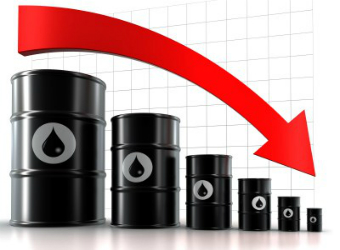Oil prices fell on Friday after a consultancy report forecast a rise in OPEC production for July despite the group’s pledge to curb output, reigniting concerns the market will stay awash with crude.
Petro-Logistics, which tracks OPEC supply forecasts, said OPEC crude production would rise by 145,000 barrels per day (bpd) this month, taking the group’s combined output above 33 million bpd.
Higher supply from Saudi Arabia, the United Arab Emirates (UAE) and Nigeria would drive this month’s gains, it said.
The news weighed on oil prices which had been trading in positive territory for most of the session.
International benchmark Brent crude futures fell 40 cents to $48.90 per barrel by 8:56 a.m. ET (1256 GMT). U.S. West Texas Intermediate (WTI) crude futures were 39 cents lower at $46.53 per barrel.
During the previous trading session both benchmarks rose to their highest levels since early June in choppy trading, having been pushed higher by data released on Wednesday showing U.S. crude and fuel inventories fell sharply last week.
Despite the drop, U.S. oil stocks, at roughly 490 million barrels, remain well above the five-year average, while U.S. production has increased almost 12 percent since mid-2016 to 9.4 million bpd. Investors were also taking positions ahead of a meeting between OPEC and non-OPEC members in Russia on Monday at which they will discuss compliance with agreed production cuts and progress towards rebalancing an oversupplied market.
Investors were also taking positions ahead of a meeting between OPEC and non-OPEC members in Russia on Monday at which they will discuss compliance with agreed production cuts and progress towards rebalancing an oversupplied market.
The market has been watching reports that the world’s top crude producer,Saudi Arabia, is working with other countries to draw down stocks and reduce supply, particularly as other OPEC members, including Iraq and Libya, are planning increases in output.
OPEC members Iran and Kuwait are embroiled in a diplomatic spat that saw Kuwait ordering the expulsion of the Iranian ambassador and other diplomats for alleged links to a “spy and terror” cell.
The expulsions were an unusual move for Kuwait, which typically avoids conflict and has worked at keeping good relations with all countries in the region.
The tensions come just days ahead of the oil producers’ meeting. OPEC, together with some non-members like Russia, has pledged to cut production by 1.8 million barrels per day (bpd) between January this year and March 2018.
The Unites Arab Emirates’ Energy Minister said on Friday he hoped that production cuts would have a significant impact in the third and fourth quarter.
Some analysts doubted the meeting would lead to any new intervention.
“I don’t really think the meeting will result in further output cuts. And Libya and Nigeria won’t bee too enthusiastic to cap their production,” said Frank Schallenberger, head of commodity research at LBBW.
Nigeria and Libya, both OPEC states, are exempted from the supply curbs deal and have been lifting output.
Jefferies said “actions from the next OPEC/non-OPEC working committee meeting seem unlikely”.
But “if OPEC is to achieve its objective of bringing OECD inventories back to normal levels it will need to take further steps”, the U.S. investment bank added.
Source: Reuters
